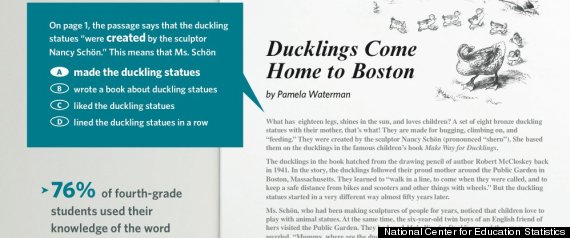If you can identify the meaning of the word "prospered" within a passage, chances are you know more vocabulary than most American high school seniors.
The results of the national standardized vocabulary tests are in, and the scores are troubling -- but not unexpected -- experts say. Average performance on the U.S. Education Department's national exams was mostly stagnant at low levels between 2009 and 2011, and the highest performers lost ground during that time.
"We should be worried about this," said Cornelia Orr, executive director of the National Assessment Governing Board. "It's not any more of a crisis than we've been seeing in reading."
On Thursday, the National Center for Education Statistics, the U.S. Education Department's research arm, released the vocabulary scores for fourth- and eighth-grade students on the 2009 and 2011 reading comprehension exams administered by the National Assessment of Educational Progress. This is the first time the results of a separate scale for vocabulary questions on the national reading comprehension test have been released. NAEP is considered the "gold standard" of standardized testing, since stakes are low for children and since the tests are designed by the federal government, which has no skin in the game in terms of how states perform. (The release also included 12th grade scores for only 2009, since that exam is only given every four years).
On average, fourth-graders scored 218 out of a total of 500 points, and eighth-graders scored 265. The top-performing fourth-graders (in the 90th percentile) only netted a 266; in eighth-grade, these students got a 311; and in 12th grade, they scored at 334.
"There is the expectation that students would know all of the words that were assessed," Orr said. "The lower the percentage of students who get these questions correct means they do not know enough."
Fourth-graders were tested on words like created, spread, clenched, outraged, puzzled and striking. Eighth-graders were expected to know anecdotes, edible, replicate, specialty, laden and permeated. High school seniors were asked about prospered, capitalize, articulate, proactive, mitigate and delusion. As NCES described it, these words are used in written language across a variety of content areas.
The results are particularly concerning, some say, as most states begin implementing the Common Core standards in language arts. The learning standards represent higher goals for what kids should know, and are supposed to result in a sustained focus on less material (rather than a general focus on too much material). The standards also push a significant amount of early reading of informational texts. "What's troubling is that we haven't moved the needle more on vocabulary," said Sharon Darling, president of the National Center for Family Literacy. "With the upcoming Common Core standards, it's going to be a steep hill to climb."
The results are also vexing because early vocabulary skills have long been a divider between rich and poor kids before they even step foot in the classroom: a seminal study in 1995 found that children whose families were on welfare heard on average 616 words per hour, while children from wealthier families heard 2,153 words per hour. These results, Darling said, have been shown to last into adulthood.
And apparently, schools aren't helping to narrow that gap. "There's quite a bit written on vocabulary and the best way to teach it -- unfortunately we're not seeing it go into the classroom," said Margaret McKeown, a learning research professor at the University of Pittsburgh School of Education. "For the younger kids, teachers are using as vocabulary words words that kids already know."
While eighth-graders who performed at lower levels than their peers in 2009 scored higher in 2011, fourth- and eighth-graders at the top of the performance curve actually scored lower in 2011 than in 2009. Top scores in fourth grade declined from 269 to 266, and from 314 to 311 in eighth grade. "We're losing at the top," said Mark Schneider, the former NCES commissioner who is now a vice president at the American Institutes of Research. "What's happened is that where there's been changing in scores, it's gone down at the two top tiers. It's very disappointing because we're not getting the kinds of gains we need at the top in a global economy."
The exams didn't test for rote definitions, instead checking to see if students understood words' meanings within passages. NCES designed the vocabulary scoring to be compatible with overall reading scores, and found the two to be closely linked. NCES commissioner Jack Buckley said a significant amount of the variance in reading scores can be attributed to differences in vocabulary abilities. That's important because historically, while students have gained in math over time, reading scores have been notoriously flat and hard to change. "We know how to teach math -- it's a school-based skill," Schneider said. "We've had a really hard time in trying to teach language arts, because vocabulary and reading are things that are wired into students before they even set foot into a classroom."
Darling said the results underscore a need for more emphasis on making sure kids learn vocabulary at home. "We need to look outside what teachers can do and look at out-of-school time in a new way," she said. "We need to look at activities that are fun and engaging."
While it's hard to interpret trends between only two administrations of one test, researchers point out that only in Pennsylvania did fourth-grade students score higher in 2011 than in 2009. Overall, most states stagnated, but average students in Arkansas, Indiana and Iowa did worse in 2011 than in 2009.

Posted: 12/06/2012
Huffington Post